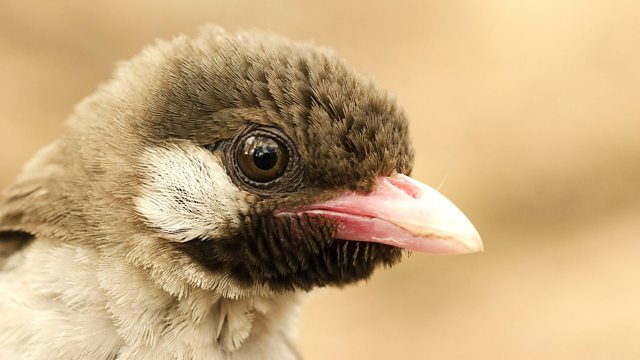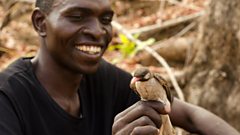Honeyguide
The greater honeyguide is unique: it is the only wild animal that has been proven to interpret human language. Brett Westwood tells the sweet story of a bird in the bush.
The greater honeyguide is unique: it is the only wild animal that has been proven to selectively interpret human language. Brett Westwood tells the sweet story of a bird that leads human honey hunters to wild bees' nests in order to share the rewards - perhaps one of the oldest cultural partnerships between humans and other animals on Earth. With biologist Claire Spottiswoode, anthropologist Brian Wood, and honey hunters, Lazaro Hamusikili in Zambia and Orlando Yassene in Mozambique, and the calls of the honeyguide. Producer: Tim Dee.
Last on
Clip
-
![]()
How parastic honeyguides kill in the nest
Duration: 01:41
Dr Claire Spottiswoode

She has collaborated with the  in Mozambique’s to study the remarkable mutualism between human honey-hunters and greater honeyguides that lead them to wild bees’ nests. She also studies co-evolutionary arms races between brood-parasitic birds such as the honeyguides, cuckoos and parasitic finches and the host species they exploit to bear the costs of raising their young.
For more information and other projects visit African Cuckoos.
Lazaro Hamusikili

Picture: Dr Claire Spottiswoode
Orlando Yassene

Picture: Dr Claire Spottiswoode
Brian Wood

His work is grounded in the field of human behavioral ecology, addressing how evolutionary processes and environmental contexts influence human behavior. Topics include how people decide where and with whom to live, how they acquire foods, and how foods are shared.
Broadcasts
- Tue 18 Oct 2016 11:00Â鶹ԼÅÄ Radio 4
- Mon 24 Oct 2016 21:00Â鶹ԼÅÄ Radio 4



